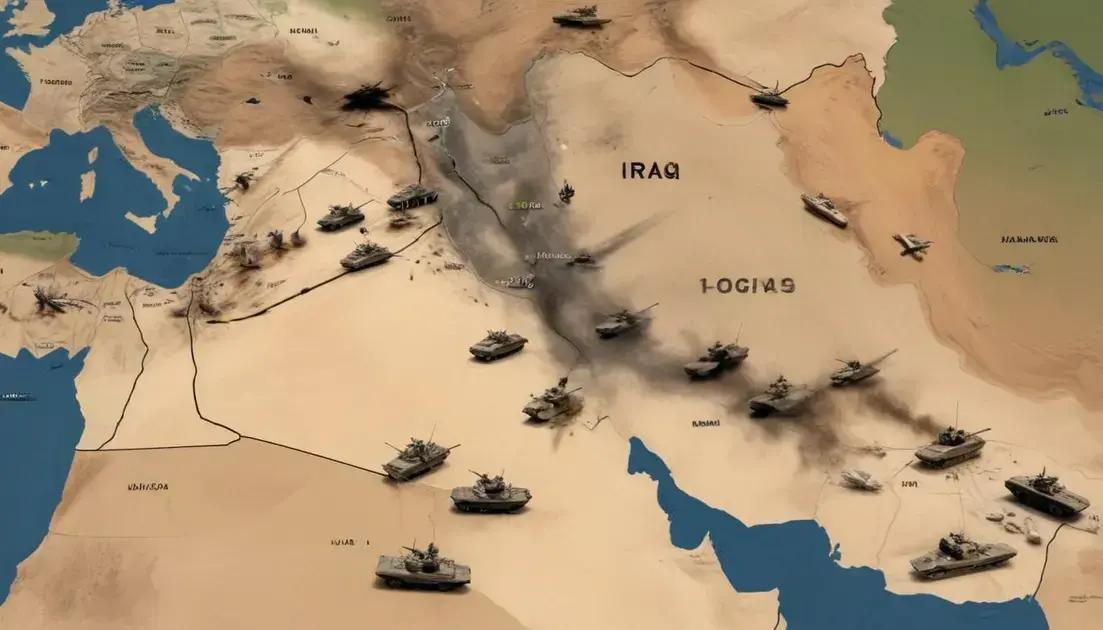
Iraq 2003: the expanding American empire
The Iraq War significantly reshaped Middle Eastern geopolitics and American foreign policy. Key lessons learned from the invasion include the necessity of clear objectives, a deep understanding of local dynamics, and the importance of international support. These factors are crucial for effective interventions and rebuilding efforts in post-conflict regions, ensuring stability and lasting peace.
The Iraq War marked a significant turning point in global politics—reshaping the Middle East in ways we’re still grappling with today. Why did it happen and what does it mean for the future?
The rise of American influence post-Saddam
After the fall of Saddam Hussein, American influence in Iraq grew significantly. The U.S. aimed to establish a democratic government while reshaping the region’s political landscape. Many Iraqis hoped for stability and progress, but the outcome wasn’t straightforward.
Governance Changes
The U.S. began by helping to draft a new constitution. This aimed to promote democracy and human rights. However, differences among ethnic groups sometimes made cooperation difficult. Many people wanted to ensure their voices were heard in the new government.
Impact on Regional Politics
American presence in Iraq altered relationships with neighboring countries. Nations like Iran saw the U.S. as a threat, while allies adjusted their strategies. The fight against terrorism became a primary focus, with the U.S. working alongside Iraqi forces.
Cultural Influence
With the rise of American influence came a wave of Western culture. This affected everything from music and movies to dining habits. Some Iraqis embraced these changes, while others feared they’d lose their identity.
In summary, the rise of American influence post-Saddam brought both opportunities and challenges. It reshaped Iraq’s political framework and changed the region’s dynamics in profound ways.
Impact on Middle Eastern geopolitics
The impact on Middle Eastern geopolitics following the Iraq War was significant. The power balance in the region shifted dramatically. Many countries had to rethink their strategies in light of new realities.
Shifts in Alliances
New alliances formed as nations adjusted their positions. Countries like Iran gained influence in Iraq. This changed how they interacted with their neighbors. Traditional allies began to feel uncertain about their security.
Increased Sectarian Tensions
The war also stirred up sectarian tensions. Sunni and Shia groups fought for power in Iraq. This conflict spread to other nations, such as Syria and Lebanon, where similar divisions exist.
Role of Extremist Groups
With the chaos post-war, extremist groups capitalized on the situation. Groups like ISIS emerged, leading to further instability. Their actions threatened not only Iraq but also surrounding countries.
In short, the Iraq War reshaped Middle Eastern geopolitics in many ways. The effects are still felt today, creating an environment of uncertainty and ongoing conflict.
Consequences of the war on American foreign policy
The consequences of the war on American foreign policy have been profound and far-reaching. The Iraq War changed how the U.S. interacts with the world.
Shift toward Interventionism
One major consequence was a shift toward interventionism. The U.S. became more willing to intervene in other countries, pushing for regime changes. This sometimes led to increased instability in regions.
Focus on Counterterrorism
Another impact was the focus on counterterrorism. The events following the war led to a strong emphasis on combating extremist groups. This influenced numerous military and diplomatic decisions.
Relations with Allies
The war affected relationships with international allies. Some countries supported the invasion, while others opposed it. This division strained old partnerships and created new diplomatic challenges.
A lasting consequence is the U.S. reputation abroad. Many view the war as a controversial decision, affecting trust and credibility. Now, American officials often face skepticism in world affairs.
Lessons learned from the invasion
There are important lessons learned from the invasion of Iraq that can shape future decisions. Understanding these lessons helps prevent repeating past mistakes.
Importance of Clear Goals
One key lesson is the need for clear goals. Without a defined plan, it’s easy to lose direction. The invasion aimed to remove Saddam but lacked a solid strategy for what came next.
Understanding Local Dynamics
Another lesson is understanding local dynamics. Engaging with local communities and cultures can improve outcomes. Ignoring these factors can lead to misunderstandings and conflict.
The Role of International Support
International support is also crucial. Broad coalitions can lend credibility to interventions. Strong alliances can help stabilize a region post-conflict, making the recovery process smoother.
Additionally, it’s clear that rebuilding efforts must be prioritized. Investing in infrastructure and governance can aid a country’s recovery. The absence of these efforts can create long-term challenges.
Conclusion
In conclusion, the impact of the Iraq War on American foreign policy and the Middle East is profound. The lessons learned from the invasion highlight the need for clear goals, understanding local dynamics, and fostering international support. These key points can guide future decisions in foreign interventions.
Furthermore, rebuilding and stabilizing nations after conflict is essential for lasting peace. Recognizing these lessons can help avoid past mistakes. By applying this knowledge, the U.S. and other nations can work towards better outcomes and a more secure world.


